The downtown area is small but highly variegated,
including some of the city’s oldest and newest landmarks, as well as
some of its most exotic and eccentric neighborhoods. Colorful Chinatown,
exuberant North Beach, posh Nob and Russian Hills, run-down Polk
Street, the bustling Financial District, the graceful Ferry Building,
and the noble architecture and cultural venues of the Civic Center – all
these and more are packed into San Francisco’s heart. This is where you
can ride the legendary cable cars
on their most scenic routes, and don’t forget to climb up Telegraph
Hill, where Coit Tower stands as one of the city’s most loved landmarks,
competing successfully with the Transamerica Pyramid not far away.
|
The Bay lay undiscovered
by Europeans until 1769, and for years was little more than a Spanish
mission village called Yerba Buena, becoming Mexican in 1821. The first
great boost came when gold was discovered at Sutter’s Mill in 1848.
Hundreds of thousands from all over the world came to try their luck in
the Gold Rush. At the same time, the US took possession of the West
Coast. The Transcontinental Railway helped to firmly establish the
area’s financial base.
|
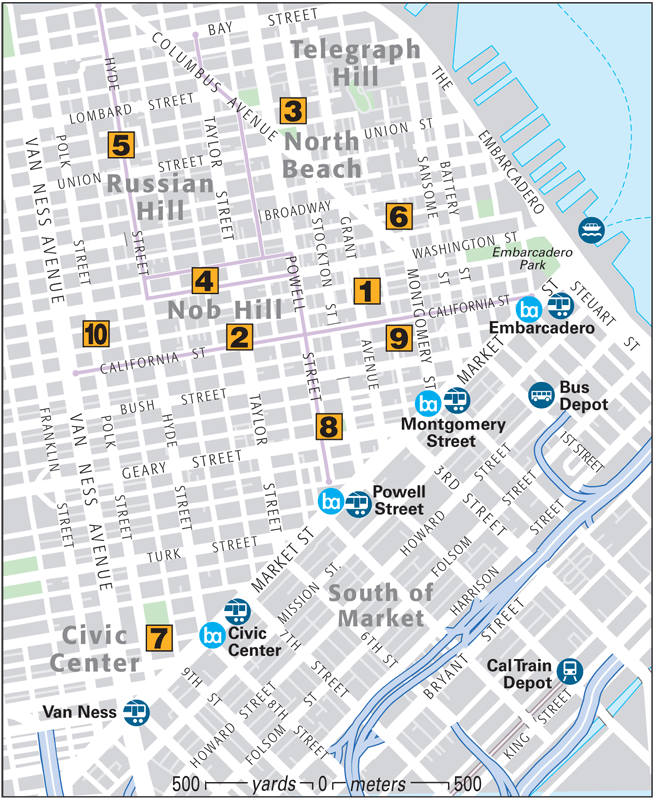
SightsChinatown Since
its beginnings in the 1850s, this densely populated neighborhood has
held its own powerful cultural identity despite every threat and
cajolery. To walk along its cluttered, clattering streets and alleys is
to be transported to another continent and into another way of life – a
“city” within the city .
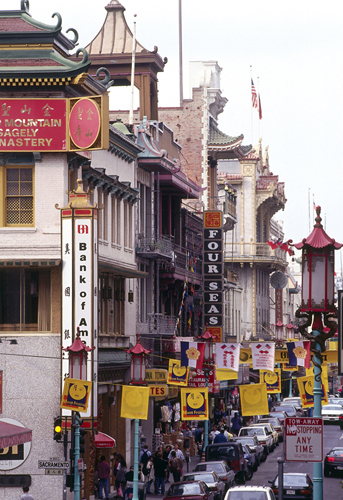
Chinatown
Grace Cathedral Inspired
by French Gothic architecture yet constructed of reinforced concrete,
these contradictory qualities have given rise to one of the city’s
best-loved landmarks . North Beach This
lively neighborhood is the city’s original “Little Italy” and is still
noted for its great Italian restaurants and cafés, mostly lined up along
and near Columbus Avenue. In the 1950s, it was also a magnet for the
Beat writers and poets, most notably Jack Kerouac and Allen Ginsberg,
who brought to the area a Bohemian style which it still sports today.
This is a great place for nightlife, from the tawdry bawdiness of
Broadway strip joints to the simple pleasures of listening to a
mezzo-soprano while you sip your cappuccino (see North Beach Views).
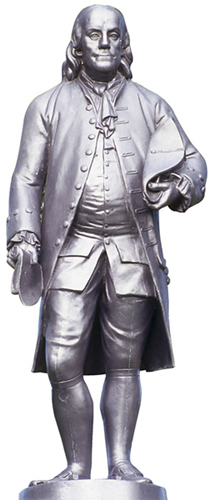
Benjamin Franklin statue, North Beach
Nob Hill With
the advent of the cable car, San Francisco’s highest hill was quickly
peopled with the elaborate mansions of local magnates – in particular,
the “Big Four” who built the Transcontinental railway
– and the name has become synonymous with wealth and power. The 1906
earthquake, however, left only one “palace” standing, now the Pacific
Union Club, which still proudly dominates the center of the summit.
Today, instead of private manses, Nob Hill is home to the city’s
fanciest hotels and apartment buildings, as well as Grace Cathedral.
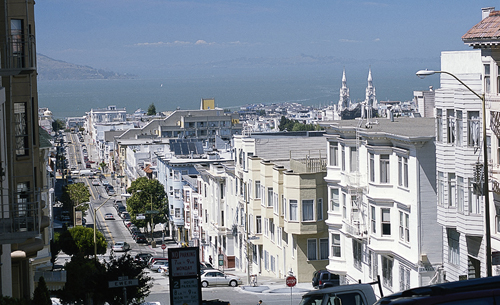
Nob Hill
Russian Hill Another
of San Francisco’s precipitous heights, one side of which is so steep
you’ll find no street at all, only steps. The most famous feature of
this hill is the charming Lombard Street switchback – “The World’s
Crookedest Street,” – which attests to the hill’s notoriously
unmanageable inclines .
As with Nob Hill, with the cable car’s advent, Russian Hill was claimed
by the wealthy, and it maintains a lofty position in San Francisco
society to this day. It supposedly took its name from the burial place
of Russian fur traders, who were among the first Europeans to ply their
trade at this port in the early 1800s. Jackson Square Renovated in the 1950s, this neighborhood right next to the Transamerica Pyramid
contains some of San Francisco’s oldest buildings. In the 19th century
the area was notorious for its squalor, and was nicknamed the “Barbary
Coast,” but brothels and drinking establishments have given way today to
upscale offices and the city’s most lavish antiques shops. The blocks
around Jackson Street and Hotaling Place feature many original brick,
cast-iron, and granite façades.
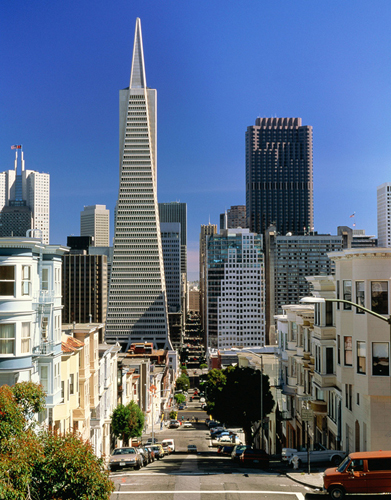
Jackson Square
Civic Center The
city’s administrative center is an excellent example of grand Beaux
Arts taste and illustrates San Franciscans’ pride in their city.
It is perhaps the most ambitious and elaborate city center complex in
the US and it continues to undergo enhancements. Besides the imposing
City Hall, with its vast rotunda, gold-leaf detailing, and formal
gardens, the area also includes the War Memorial Opera House, the Louise
M. Davies Symphony Hall, the Herbst Theater,
the State Building, the New Main Library, and the monumental Old Main
Library, re-inaugurated in its new incarnation as the Asian Art Museum.
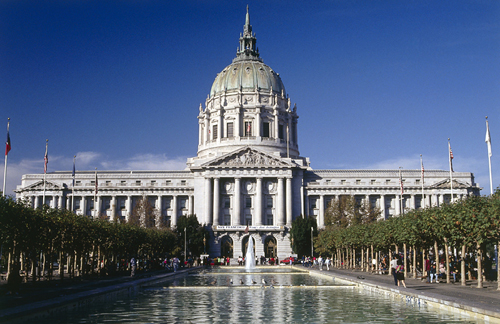
City Hall, Civic Center
Union Square After
18 months of construction, this important square, which gets its name
from the pro-Union rallies held here in the early 1860s, has a
$25-million new look that includes performance spaces, grassy terraces,
and improved parking. It is now the center for high-end shopping.
Located with the edges of the Financial District on one side and the
Theater District on the other, it is at its most picturesque along Powell Street, where the cable cars pass right in front of the historic St Francis Hotel. The column in the center commemorates Admiral Dewey’s victory at Manila Bay during the Spanish-American War of 1898. Financial District Montgomery
Street, now the heart of the Financial District, was once lined with
small shops where miners came to weigh their gold dust. It marks roughly
the old shoreline of shallow Yerba Buena Cove, which was filled in
during the Gold Rush to create more land. Today it is lined with early
20th-century banking “temples” and modern fabrications of glass and
steel. At the end of Market Street stands the newly renovated Ferry
Building, which once handled 100,000 commuters a day before the city’s
bridges were constructed, and is now a bustling meeting spot with cafés
and artisan food shops. Its tower is inspired by the Moorish belfry of
Seville Cathedral in Spain.
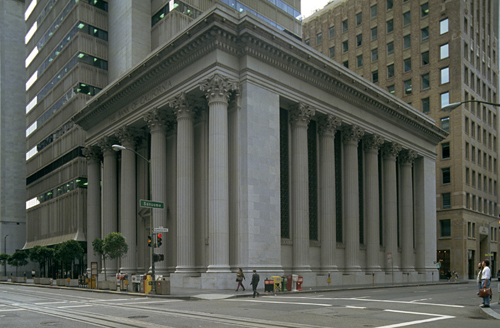
Bank of California, Financial District
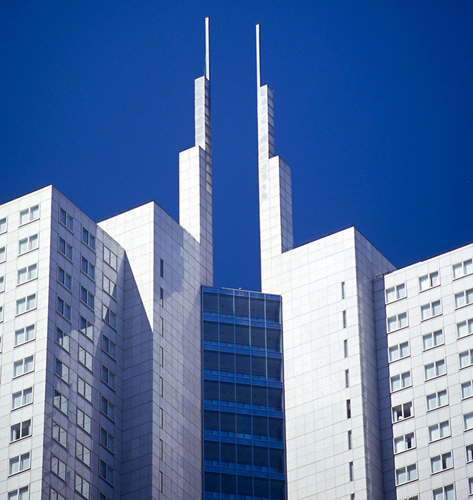
First Interstate Center, Financial District
Polk Street Historically,
the southern part of this street, known as “Polk Gulch,” was the city’s
first openly gay district, before the rise of the Castro
in the 1970s. Since then it has grown shabbier, but it still attracts
younger gays to its clubs, bars, and shops. However, this stretch is
best avoided after dark. At the other end, down from Russian Hill, Polk
Street is one of the city’s shopping and dining lures, with many fine
choices to tempt a discerning clientele.
|